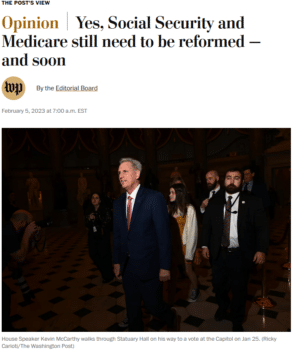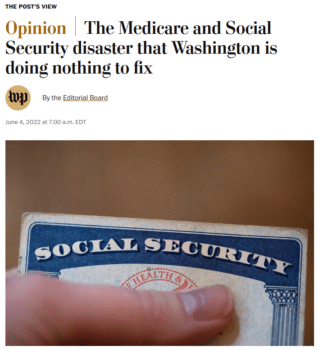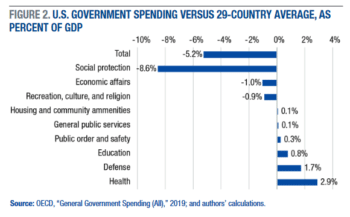
The Washington Post (2/5/23) warns that in 2034, when Social Security exhausts its reserves, “seniors face an immediate 25 percent cut in benefits.” Its solution to this problem: cutting benefits sooner, plus raising (regressive) payroll taxes.
When Jeff Bezos bought the Washington Post for $250 million in 2013, he didn’t transform it into a paper that elevated the perspectives of the wealthy elite—it had already been that for decades. What he did do was put it on steroids: Over the next three years, the Post doubled its web traffic and surpassed the New York Times in its volume of online postings. One result: The paper’s traditional hostility to federal retirement programs has become only more amplified.
As progressive economist Dean Baker (FAIR.org, 3/19/18) has written, “The Post calling for cuts to [Social Security and Medicare] is pretty much as predictable as the sun coming up”—it’s been up to this for decades, as Bezos is probably aware. So when it once again called for retirement benefit cuts on Sunday, February 5, Baker was unsurprised (Beat the Press, 2/5/23).
The Post came out swinging in the piece (2/5/23), with the headline “Yes, Social Security and Medicare Still Need to Be Reformed—and Soon.” It began by fretting over the depletion of the trust funds for Social Security and Medicare:
The longer Congress puts off fixes, the more painful they will become for the 66 million seniors, and growing, who receive monthly Social Security payments and the approximately 59 million people enrolled in a Medicare plan.
Among other solutions, the board suggested “raising the Medicare eligibility age to 67 to match the existing Social Security retirement age for those born in 1960 or later.” As Baker pointed out (Beat the Press, 2/5/23):
President Ronald Reagan and Speaker Tip O’Neill got together in 1983 to pass a bipartisan plan that allowed working people to pay for tax cuts for the wealthy (Extra!, 3—4/97). (image: WAMU, 10/1/13)
As people who follow policy have long known, this would have little effect on the budget, since it would raise the amount spent on providing insurance in the ACA exchanges.
‘Bipartisan grand bargain’
But that was far from the worst of the Post’s suggestions. In the final paragraph of the editorial, the Post made its intentions even clearer. Attempting a call to action, the board wrote:
Mr. Biden was among 88 senators who voted in 1983 for a bipartisan grand bargain, negotiated by a commission led by Alan Greenspan and signed into law by President Ronald Reagan, that rescued Social Security. Forty years later, if he and Republican leaders are willing to work in good faith, Mr. Biden could safeguard the greatest legacies of both the New Deal and the Great Society.
To translate: In 1983, Congress “rescued” Social Security by cutting it. The 1983 law did not change the actual age at which you can retire and draw Social Security benefits. It left that at 62. Instead, it simply said you’d get less money for retiring at any point before the new full retirement age, which reached 67 last year. For instance, those retiring at 62 today face a 50% larger cut in benefits for early retirement compared to before 2000.

For the Washington Post (6/4/22), the U.S. keeping retirement benefits at their current level is making “promises to its elderly that it cannot possibly keep while continuing to do right by younger generations.”
The Post apparently remembers these reforms fondly. And it wants more.
‘Modest benefit adjustments’
This is not the only time the editorial board has called for stiffing the seniors in recent months. Last year, the board published an editorial (6/4/22) headlined “The Medicare and Social Security Disaster That Washington Is Doing Nothing to Fix.” The board sounded the alarm: “The nation has made promises to its elderly that it cannot possibly keep while continuing to do right by younger generations.”
Before calling for “some mix of modest benefit adjustments and tax hikes” to shore up these earned benefit programs, the Post spent most of the piece attempting to instill fear in its readership about the latest projections for the finances of Social Security and Medicare. After laying out the numbers, the board wrote:
These numbers may seem small. They are not; total federal spending has historically hovered around 20% of GDP. The trustees are projecting a vast expansion of outlays for the elderly that would hollow out the government’s ability to spend on education, infrastructure, anti-poverty programs and other investments in children and working-age adults.
The Post quite explicitly places Social Security and Medicare in direct conflict with other government programs in this passage. But under even minor scrutiny, this idea of a zero-sum conflict between protecting elderly entitlement programs and investing in children falls apart.
Why can’t we spend more on social programs? The answer is—we can. According to a 2019 report from the University of New Hampshire, total government spending in the U.S., which sits at 38% of GDP, puts the U.S. at 12th out of the 13 highest-income countries in the report.
The U.S. does rank first in healthcare spending, but this is not because of largesse directed towards the elderly. Rather, it is a result of the brutally inefficient design of the U.S. healthcare system, marked by administrative bloat and inflated prices.

Compared to high- and middle-income countries, the U.S. spends far less of its GDP on social protection, and spends more on its military—and on its highly inefficient healthcare system (Carsey Research, Fall/19).
As Baker observes (Beat the Press, 2/5/23), Medicare, which is much more efficient than private health plans, points to the solution, not the problem. In fact, studies have estimated that Medicare for All, a target of the Post’s vitriol in the past (1/27/16, 8/12/18, 5/4/19), would actually lower overall healthcare spending while improving health outcomes (Jacobin, 12/3/18).
What to do with resources
When it comes to spending on social protection, which includes retirement programs for the elderly, the story is more straightforward. The U.S. comes in last place among the highest-income countries. It spends 57% less per capita than the average in these countries. As the UNH report explains:
Social protection is the only spending category for which U.S. spending is greatly lower than other countries. The difference explains how the United States can spend so much more than other countries on its military and health services while still spending so much less than other countries overall.
To portray Social Security cuts as necessary in light of this evidence is absurd.
What we’re really talking about when we’re discussing Social Security and Medicare is what we want to do with our resources as a country. We have more than enough wealth to provide solid retirement benefits and good medical care to the elderly. The question is: Do we want to do that? Or do we want to cut the programs that do those things? It’s really that simple.
It just so happens the Post favors cuts over human welfare. Exactly the kind of perspective Bezos deemed well worth putting his money behind.


